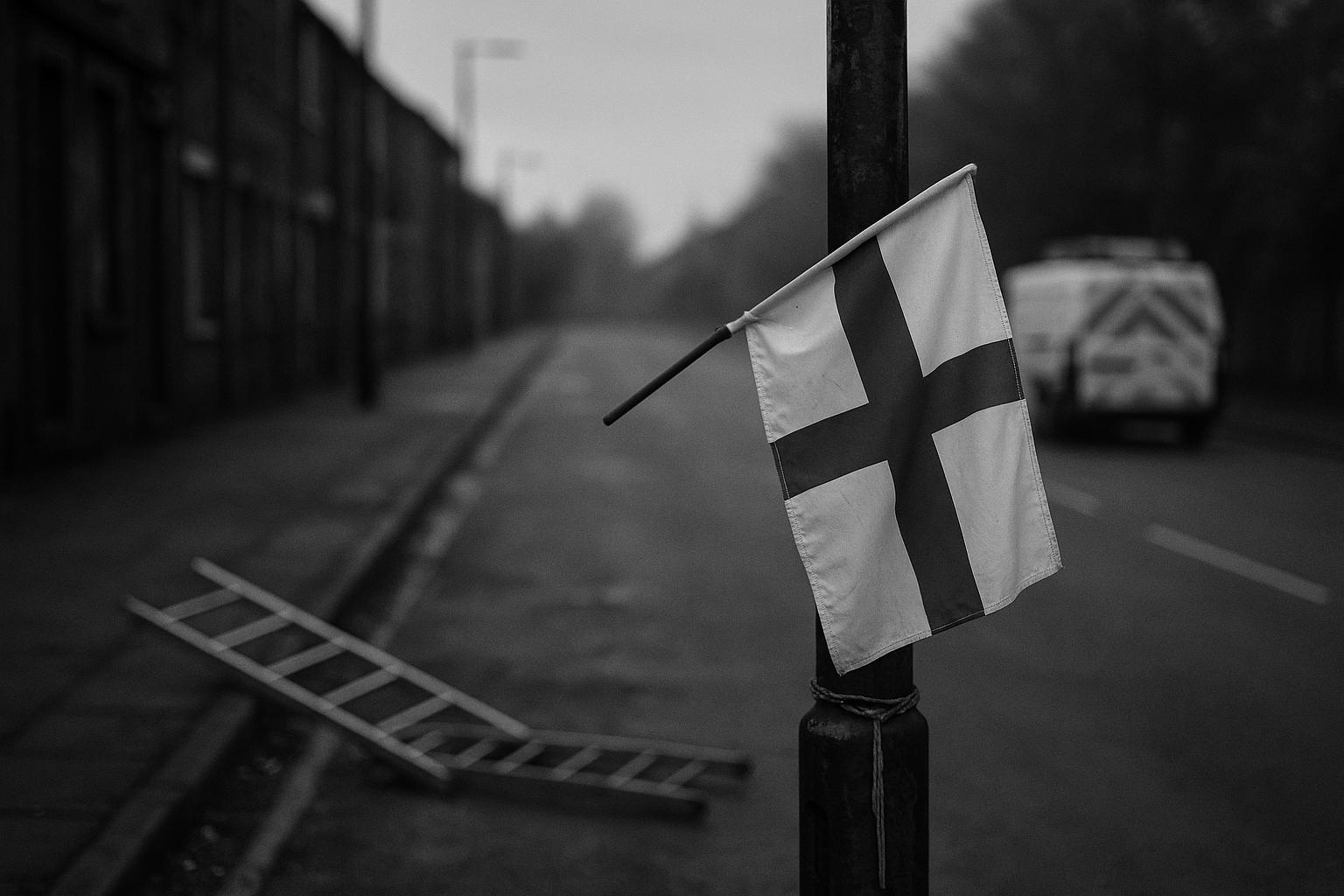An organised campaign to blanket English streets with St George’s Crosses and Union flags has provoked a fresh row between patriotic activists and local authorities, with scenes of confrontation in parts of London and the West Midlands over the past week. Activists behind “Operation Raise the Colours” say they are exercising harmless patriotism; councils and highways teams say unauthorised attachments to lamp‑posts and roundabouts pose safety risks and must be removed. The dispute has been played out on social media and in video shared by local news outlets, and it has touched on wider tensions around community cohesion and political symbolism. (Events reported 18–20 August 2025.)
Organisers of Operation Raise the Colours have used online groups to co‑ordinate the distribution and erection of dozens of flags, with volunteers posting offers of transport, ladders and manpower to cover streets and roundabouts. Supporters describe the activity as a non‑political expression of pride in England and Britain; one activist told social media followers the movement would “refuse to be bullied” and replace any flags removed. Campaigners say the displays have appeared in towns including Bradford, Newcastle, Norwich, the Isle of Wight and numerous neighbourhoods in Birmingham.
Local authorities and their staff, however, say the flags are being attached without permission to council‑owned infrastructure and that removals are routine maintenance to protect public safety. Tower Hamlets Council said in a statement that “where flags are attached to council‑owned infrastructure without permission, they may be removed as part of routine maintenance,” warned members of the public not to climb lamp‑posts, and condemned verbal abuse directed at staff who removed flags near a central hotel. Video footage and witness accounts showed council teams cutting flags down and, in some cases, being confronted by angry residents as they worked in the early hours.
Birmingham City Council has framed its actions in technical, safety terms: highways crews are preparing to upgrade street lighting to energy‑efficient LED fittings and require lamp columns to be free from attachments. The authority said it routinely removes unauthorised banners and flags because they can obscure visibility, create electrical and falling‑debris hazards and weaken columns — and that roughly 200 items have already been taken down this year as part of that programme. Local reporting from the city captured both volunteers hanging flags across suburbs such as Weoley Castle and Northfield and residents painting St George crosses on mini‑roundabouts, actions that have produced sharply divided reaction on the ground.
Those opposed to the flag campaign point to an uncomfortable backdrop of selective tolerance and political signalling. Critics have noted that pro‑Palestine banners and flags were permitted to remain on lamp‑posts and council buildings in some areas during the Gaza crisis, a fact that campaigners say underlines perceived hypocrisy when English flags are removed. Tower Hamlets and other authorities say their policies on public safety and permitted displays are applied consistently, and that some individuals placing flags were not local residents — a point cited by the borough as relevant to its attempts to monitor tensions.
Beyond local disputes, the campaign has also attracted scrutiny over its motives and potential exploitation by political groups. Anti‑racism organisations and community leaders have warned that organised, large‑scale displays of national flags can be co‑opted by far‑right actors to provoke division; journalists and broadcasters covering the story have highlighted concerns about links between some organisers and extremist actors elsewhere, and about the risk that patriotic imagery could be weaponised amid heated debate over immigration and asylum accommodation. At the same time, activists insist their intent is apolitical and civic.
Downing Street has expressed broad support for public displays of patriotism while stopping short of intervening in individual local disputes. “The Prime Minister has always talked about his pride in being British, his patriotism … patriotism will always be an important thing to him,” a Downing Street spokesman said to reporters. Senior Conservative figures have criticised councils they say are unevenly enforcing rules: Susan Hall told the Daily Mail she found the removal of English flags “outrageous,” and Sir Iain Duncan Smith described the situation as an “unnecessary mess,” urging clearer, consistently applied rules on attachments to street furniture.
For now the standoff looks set to continue. Councils say they will enforce safety rules and ask the public to express patriotism lawfully and from private property; some have worked with the police and tension‑monitoring bodies to avoid escalation. Activists say they will replace flags removed and continue to coordinate through social media. The dispute has therefore become a test of how authorities balance the right to display national symbols with public‑safety duties and the imperative to protect community cohesion in already fractious neighbourhoods.
📌 Reference Map:
##Reference Map:
- Paragraph 1 – [1], [2], [3]
- Paragraph 2 – [1], [2], [3]
- Paragraph 3 – [4], [1], [3]
- Paragraph 4 – [5], [1], [7]
- Paragraph 5 – [1], [4], [2]
- Paragraph 6 – [2], [3], [4], [7]
- Paragraph 7 – [1], [2]
- Paragraph 8 – [4], [5], [3], [1], [7]
Source: Noah Wire Services
